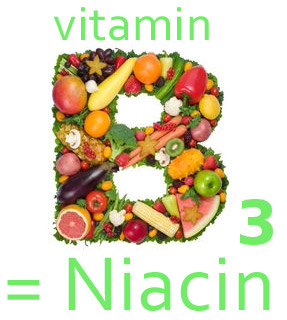Diet, Nutrition & Supplements (30)
Niacin - vitamin B3 - elevates HDL levels (the "good" cholesterol) more than popular medications
- Published in Diet, Nutrition & Supplements
- Written by Monica

Low HDL-C levels are an independent risk factor for development of coronary heart disease (CHD).[1] At all levels of total cholesterol, HDL-C shows a strong inverse association with incidence of CHD. Every 1 mg/dl increase in HDL is associated with a 2-3% decrease cardiovascular risk.[1]
Among men and women aged 49-82 years, who were free of CHD at baseline, after a follow up of 12 yr, the participants with high HDL-C levels (over 60 mg/dL) had half the risk of cardiovascular events compared with participants with low HDL-C levels (below 40 mg/dL).[2] Another large study of 4,500 subjects aged 16-65 years, found after a follow-up of 6 years that individuals with HDL-C levels below <35 mg/dl were at 4 times higher heart disease risk than those with HDL-C levels over 35 mg/dl.[3]
The prevalence of low HDL levels in apparently healthy US adults is 35% in men (defined as below 40 mg/dL or 1.03 mmol/) and 39% of women (below 50 mg/dL or 1.29 mmol/L).[4] Among patients with established cardiovascular disease, 20% to 60% have low HDL levels.[5-7] Furthermore, low HDL levels are part of the criteria for the metabolic syndrome [8] and are highly prevalent among patients with diabetes, affecting more than 50% of men and 66% of women who are diabetic.[9, 10]
Statins are the most commonly used medications for heart disease. However, while statin is the most effective medication to reduce LDL (the "bad" cholesterol) levels, there remains an unacceptably high residual risk in patients who have been on statin treatment. Even after intensive statin treatment that has achieved very low LDL levels, morbidity and mortality rates among statin-treated patients still remain approximately two thirds to three quarters of those found in patients who were getting placebo.[11, 12] This large residual risk clearly indicates that LDL only modestly impacts atherosclerosis at best. Therefore, medical research is investigating HDL elevating treatments with the aim to reduce residual risk, and prevent development of cardiovascular diesase in the first place.
Article Tags
Cheating on a diet - good or bad?
- Published in Diet, Nutrition & Supplements
- Written by Monica

In discussions about dieting, a topic that often comes up is that of "cheating"; is it good or bad to cheat once in a while during a diet?
In order to answer this question appropriately, it is necessary to look at both the quantitative and qualitative aspects of dieting, and the physiological and psychological responses they each elicit...
Dieting - what are we really talking about?
The dictionary definition of "diet" and "dieting" is "to eat and drink sparingly or according to prescribed rules" or "a controlled intake of foods, as for medical reasons or cosmetic weight loss".
However, these definitions do not tell us anything about the two different aspects of dieting; the quantitative and qualitative parts, and their respective consequences. In everyday parlance, dieting usually implies both eating less calories (quantitative aspect) than usual, and eating "specific" foods (qualitative aspect).
Nevertheless, when considering the consequences of "cheating" and trying to answer the question whether it is a good or bad practice, it is important to distinguish these aspects of dieting. Let's take a quick look at each:



